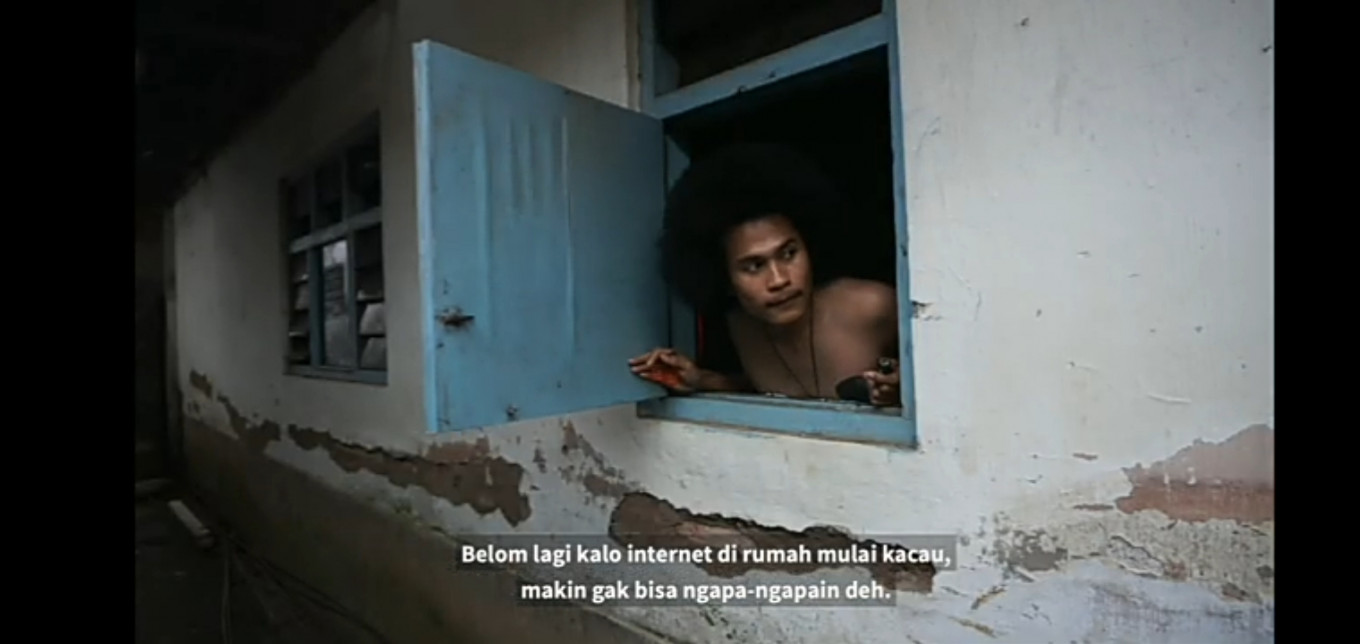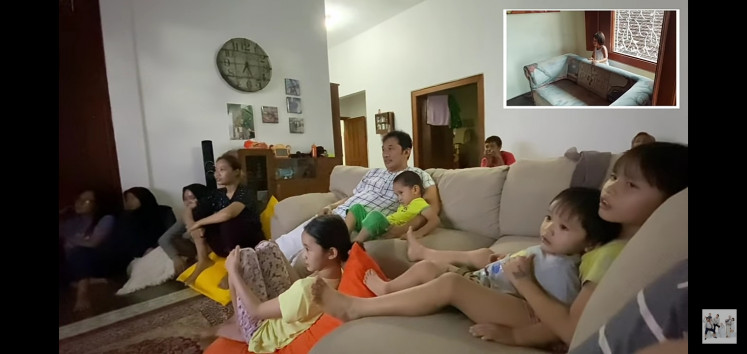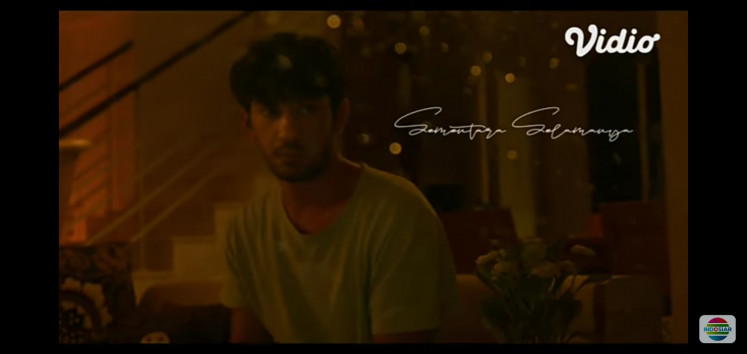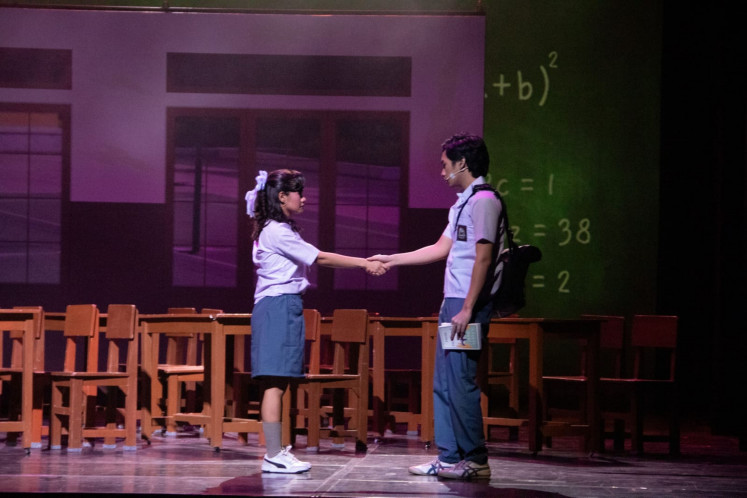Popular Reads
Top Results
Can't find what you're looking for?
View all search resultsPopular Reads
Top Results
Can't find what you're looking for?
View all search resultsSlow days at the movies: New field games for filmmakers
The reopening plan for movie theaters has been further delayed, but the green light is on for film production.
Change text size
Gift Premium Articles
to Anyone
 In tight space: A screen grab from film short Cerita Tentang Jendela (A Story About Windows). The movie by Jason Iskandar of Studio Antelope was constructed on crowd-sourcing footage sent by colleagues and friends to capture life during social and physical restrictions. (Studio Antelope/Tertiani ZB Simanjuntak)
In tight space: A screen grab from film short Cerita Tentang Jendela (A Story About Windows). The movie by Jason Iskandar of Studio Antelope was constructed on crowd-sourcing footage sent by colleagues and friends to capture life during social and physical restrictions. (Studio Antelope/Tertiani ZB Simanjuntak)
T
he film industry and enthusiasts cheered in July the decision of the Indonesian Cinema Owners Association (GPBSI) to reopen movie theaters by the end of the month, but the excitement was short lived.
On July 16, association chairman Djonny Syafruddin said the Jakarta Tourism and Creative Economy Agency had advised against the reopening due to the rising number of COVID-19 cases.
The indefinite postponement, however, affected all cinemas and theater chains throughout the country.
“The association members in the meantime will continue to put into practice the health and new normal protocols in all movie theaters,” said Djonny.
Representing Cinema XXI, a cinema chain affiliated with the association, head of corporate communications and brand management Dewinta Hutagaol said the company would comply with the government’s policies.
“Since January we have upgraded our sanitary standards by regularly disinfecting facilities. The disinfection liquid we use is the kind used by international airlines to minimize the risk of coronavirus infection but safe for humans,” she said in a written interview with The Jakarta Post.
The chain’s 218 movie theaters in 52 cities has suspended operations since the government implemented large-scale social restrictions (PSBB) at the end of March to contain the epidemic.
The number of ticket buyers had significantly decreased in March – failing to reach 20 percent of the 60 million projected in 2020 – with film producers canceling promotions and screenings.
All film productions were abruptly halted or rescheduled, leaving the industry in limbo. Thousands of crew members and technicians – mostly living on daily wages – were left jobless or changed their profession.
The film industry was among the few creative industries with a large contribution to the economy. The potential losses reached about Rp 500 billion (US$34 million) per month from movie tickets, advertisements and television.
Digital film streaming platforms contributed about 20 percent of the total income, but such services have since experienced a hike in the number of subscribers and viewing time and, therefore have become the safest alternative media for film producers to screen their productions.
Ironically, the digital platforms that made their services exclusive for Indonesian films were lagging behind in the competition against the platforms that stream popular Asian movies or drama series.
Klik Film, a streaming app under powerhouse Falcon Pictures, for example, offered Hollywood movies, Korean and Thailand productions in its archive besides hundreds of the production house’s own films.
There were plans to open drive-in cinemas, but location and film licensing remained a problem.
Many efforts had been made by different film communities to cushion further blows to the industry.
Infoscreening, a community in the digital realm that called itself an “alternative cinema”, organized the live-streaming of short movies on YouTube in May and encouraged viewers to donate for film workers.
GoPlay, the video-on-demand platform of fintech Gojek, in cooperation with the Indonesian Film Board (BPI), from May to end of June, aired Indonesian movies, with 20 percent of the paid access fees going to film workers.
The Tourism and Creative Economy Ministry also provided relief funds for film workers, which were handled by the Social Affairs Ministry, as well as non-cash relief programs that included the provision of virtual workshops and training.
“We encourage film workers to hone their skills and competence now that they have more time to do so. Should they return to work, with their higher competence they could earn more,” said Saifullah Agam, the director of film, animation and advertisement with the ministry.
The ministry, he said, had completed drafting electronic handbooks containing health protocols for businesses in both the tourist sector and creative industries.
For film production, he said, there would be restrictions on the number of people involved at a shooting location. It also advises a limit in working hours “to ensure all workers lead a healthy, balanced life”.
“The main purpose of releasing the handbooks is to protect the health and the safety of the workers and the public,” Saifullah told the Post after the launch of the national campaign Indonesia Care on July 10.
The campaign, shortened as “I Do Care”, aims to restore the global image of the country’s tourism and creative industries by encouraging the public and the business to fervently promote sanitation, hygiene, safety and environmental sustainability.
The ministry would work together with regional administrations and the police to monitor the application of the safety guidelines in shooting locations – permitted in the green zones only, or areas with nil or fewer infection cases.
While many filmmakers have had second thoughts about continuing production due to the new protocols that require a bigger budget, some others have funneled their creativity in different ways.
The family of film director Hanung Bramantyo, dubbed “the Bramantyos”, created a horror short, while film director Ernest Prakasa made a sitcom series with his wife and two children.
Scouting talent: Director Hanung Bramantyo's family watch the premiere of their own movie titled Di Rumah Sendirian (Home Alone). The first movie was broadcast on YouTube in April and was followed by a series of skits with religious teachings for children. (The Bramantyos/Tertiani ZB Simanjuntak)Production house Base Entertainment created a radio drama to fill the void after delaying the release of comedy-drama Guru-Guru Gokil (Crazy Teachers). The film’s cast was involved as the voice actors and the recording was done from their homes.
Growing pain: A series of skits directed by Ernest Prakasa involves his young family of four. Broadcast on YouTube, the series follows the daily happenings inside the house. Co-written by his wife, Meira Anastasia, the show tackles communication issues between the couple and their kids, Sky and Snow. (Keluarga Ngenest/Tertiani ZB Simanjuntak)Studio Antelope launched the #BikinFilmBareng (#MakeAFilmTogether) project by collecting footage through social media to make a romantic short film titled Cerita Tentang Jendela (A Story About Windows).
The most recent was a miniseries titled Sementara, Selamanya (For A While, For Good) directed by and starring Reza Rahadian. Written by Ika Natassa, the story, covering six episodes, was designed to fit the times.
The cast only consisted of Reza and Laura Basuki, while filming was manned by a crew of seven people. Shooting took place over three days in one location.
“We pushed forward with the project to prove a point that we could be more creative during the pandemic. I hope other filmmakers can be inspired by our production,” Reza said at the virtual launch of the Indonesian Film Festival (FFI) 2020 last month.
A time to remember: The miniseries Sementara, Selamanya (For A While, For Good) screened on video-on-demand platform Vidio tells the story of married couple Saka and Zara ,who temporarily live apart due to Zara's profession as a doctor treating COVID-19 patients. (Vidio/Tertiani ZB Simanjuntak)The festival, the awards night for which is to be held in December, bears the herculean task of encouraging the public to watch Indonesian films over foreign productions while keeping the industry together under a movement called Satu Hari Satu Hal Baik Film Indonesia (One Good Thing About Indonesian Film Each Day).
“The year 2020 should be remembered as the year of optimism, hope and changes,” said festival chair Lukman Sardi.
BPI chairman Chand Parwez Servia said during the occasion that only by applying health and safety protocols could film industry workers continue producing quality works.
“After a long drought, there will be time to harvest. If there is a silver lining in all this, we are now more concerned about value unlike previously when we completed production in haste to achieve the target,” added the film producer.













